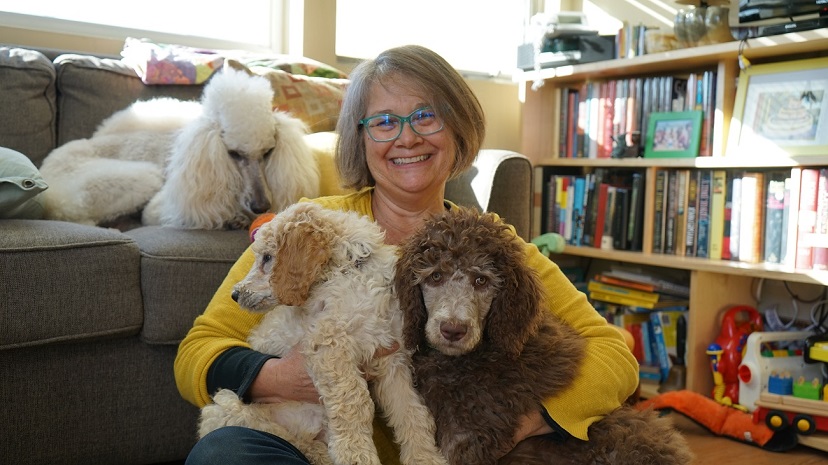Woman Works To Transform Puppies Into Mobility Service Dogs For Pasadena’s Disabled Population
Tuesday, January 30, 2018
When Janie Heinrich suffered from a spinal cord injury in 2010 that left her disabled, immobile, and likely to stay put in a wheelchair for the long term, little did she know that her dog Phoebe would lead her on a journey of newfound independence and fulfillment that she lives today.
Phoebe isn’t your average Poodle companion, though, having been a certified mobility service dog for eight years assisting Heinrich with her day-to-day life. Phoebe allows Heinrich to stay mobile and active in ways she would otherwise not be able to.
Heinrich’s frustration from the complicated process of finding a younger mobility service dog to take over duties from the aging and soon-to-be-retired Phoebe inspired Heinrich to help create a nonprofit that caters specifically to the disabled population by raising certified service dogs, which are in high demand.
The nonprofit, Mobility Service Dog West Coast Project, is headquartered here in Pasadena.
“If I had 500 dogs available tomorrow, I could have them all placed probably within days,” added Heinrich.
Unfortunately, certified mobility service dogs are scarce and the demand for the trained animals is skyrocketing, according to Heinrich.
Mobility Service Dog West Coast Project’s mission is to help close this gap by staying at the forefront of obtaining, training, and providing mobility service dogs to the mobility disabled community.
Three local breeders have donated six dogs to Heinrich’s Mobility Service Dog West Coast Project. The dogs should be received within the next three to six months.
Heinrich’s organization seeks to become the link between breeders and qualified trainers, known as puppy raisers, in order to fast track the process on a larger scale to satisfy the need.
“We are hoping to assist in filling the gap,” said Heinrich.
The first nine months of the dog’s lives are spent with puppy raisers, who develop energetic and curious pups into mature, dependable dogs.
Puppy raisers yield best results with dogs that display six main characteristics as puppies. Those all-important traits include having a well-behaved demeanor, having already been socialized in the world, having travel experience, being people-friendly, being animal-friendly, and being responsive to commands.
“They do basic dog citizenship,” said Heinrich of the puppy raisers, “and it’s a two-year process before they can actually become certified service dogs.”
Heinrich’s inspiration for creating Mobility Service Dog West Coast Project stems from her personal experience searching for a new service dog to enter her family.
The process is much more difficult than she anticipated after being told by three separate mobility service dog organizations that she is too old to receive a new dog.
“They put an expiration on me, which doesn’t feel great,” said Heinrich who is 60 years-old.
Heinrich researched two organizations that specialize in matching military veterans with dogs and another for children and young adults.
“I felt that there was a huge need just from these two mobility organizations,” explained Heinrich who says they receive on average 220 applications a month.
Out of those applications, a little over 80 percent are eligible and less than 5 percent are able to receive them because of lack of supply, according to Heinrich
“They’d be able to own and care for a dog, they’d be able to achieve functional independence with a dog allowing for their life to be brighter and fuller and richer,” said Heinrich.
For Heinrich, Phoebe assists her with balancing and other safety needs.
“She keeps me from falling over if I start to fall, she braces and when I drop things, she picks them up and hands them to me,” said Heinrich. “She makes it possible that I can go out by myself,” Heinrich added.
Heinrich’s home is currently the organization’s temporary site where the donated puppies live until they transition into the hands of her network of local puppy raisers, as she awaits a permanent office setup.
“We would love to create a community and have our office be a meetup spot for these puppy raisers so that they can interact and create a great community, and we can support them with the food and the vaccines and the tools needed,” said Heinrich.
“It’s really a community effort. We would like to go into the schools and educate people in the shops and local hotels and restaurants what a service dog is because a lot of people don’t understand,” said Heinrich.
Heinrich is in need of volunteers to make rounds visiting local shelters,humane societies, and rescues to find dogs that are ideal to train up to work as mobility dogs.
“Our ultimate vision is to have an old warehouse and make it into like a dormitory and have people come and make sure they can take care of a dog,” explained Heinrich.
To learn more about Mobility Service Dog West Coast Project and to get involved, go to Facebook.com/mobilityservicedogs and follow the organization on Twitter @mobility_dog and Instagram @mobilityservicedogs.



